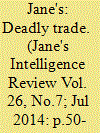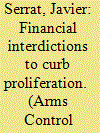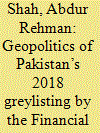| Srl | Item |
| 1 |
ID:
131893


|
|
|
| 2 |
ID:
115744


|
|
|
|
|
| Publication |
2012.
|
| Summary/Abstract |
Over the past four decades, the world has gotten several glimpses of the illicit procurement methods used to support nuclear program: Iraq's diversion in the 1980s of agricultural loan funds into its nuclear procurement program, the payment schemes of the Abdul Qadeer Khan network as part of its sale of uranium hexafluoride to Libya, and the fraudulent transaction through New York banks of shell companies linked to IRISL, Iran's state owned shipping company.
|
|
|
|
|
|
|
|
|
|
|
|
|
|
|
|
| 3 |
ID:
179858


|
|
|
|
|
| Summary/Abstract |
This article argues that, in addition to the valid reasons for Pakistan’s greylisting by the Financial Action Task Force (FATF) in 2018, geopolitical dynamics also played a crucial role behind this development. While the United States (US) under the Trump administration pushed Pakistan to seek an end to “the longest war” in Afghanistan, India, hoping to curb cross-border terrorism, capitalized on this momentum to pressure Pakistan. In order to hastily greylist Pakistan, institutional procedures of the FATF were thus disregarded. The case study demonstrates how economic coercion was used to push Pakistan to accept US and FATF demands. This article argues that Pakistan’s greylisting has created a win-for-all scenario for now. But these gains should not be overrated. Pakistan’s implementation of FATF requirements faces significant structural limitations. Still, the consensus between major actors underscores the potential of the FATF to counter money laundering and financing of terrorism globally.
|
|
|
|
|
|
|
|
|
|
|
|
|
|
|
|
| 4 |
ID:
140320


|
|
|
|
|
| Summary/Abstract |
For more than two decades, the Financial Action Task Force (FATF) has been the central governance network for developing anti-money laundering policies. It serves as a prototype of a new form of governance, linked to soft law, peer reviews, and expert advice. Literature on the FATF, however, rarely questions the transferability of this model to other areas of global governance. Seeking to fill this gap, this article analyzes the networking activities that created and maintain the FATF. I argue that two major difficulties are particularly challenging for any global governance network: initiation problems and commitment problems. The article describes how the FATF’s members have overcome these difficulties and developed the network over time. It also shows that some tools and conditions that contributed to the FATF’s success are difficult to replicate for other networks. The conclusions outline some ways to overcome these challenges and present further questions for research.
|
|
|
|
|
|
|
|
|
|
|
|
|
|
|
|
| 5 |
ID:
099511


|
|
|
|
|
| Publication |
2010.
|
| Summary/Abstract |
The following article examines how the principles of coercion theory can be applied towards the formulation of strategy aimed at countering terrorist financing. In doing so, this article provides a breakdown of coercion's relevant theoretical concepts on the subject matter. This is followed by an elaboration of the specific coercive approaches-non-military and military-that can be implemented to counter terrorist finance operations, along with an illustration, based on case-evidence, of how these approaches can be practically employed with power and policy mechanisms at the state and international levels. The article concludes with a discussion on what is required, from a coercion stand-point, to successfully counter a terrorist organization's financial operations, as well as the advantages and limitations involved in such a strategy.
|
|
|
|
|
|
|
|
|
|
|
|
|
|
|
|
| 6 |
ID:
114378


|
|
|